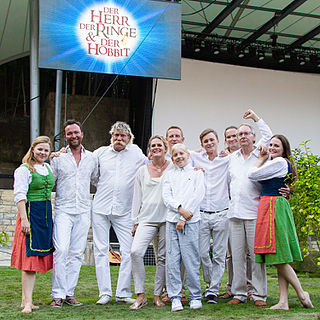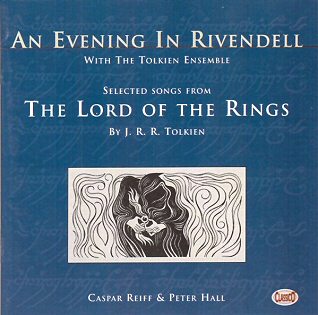
Rivendell is a valley in J. R. R. Tolkien's fictional world of Middle-earth, representing both a homely place of sanctuary and a magical Elvish otherworld. It is an important location in The Hobbit and The Lord of the Rings, being the place where the quest to destroy the One Ring began.
Treebeard, or Fangorn in Sindarin, is a tree-giant character in J. R. R. Tolkien's The Lord of the Rings. He is an Ent and is said by Gandalf to be "the oldest living thing that still walks beneath the Sun upon this Middle-earth." He lives in the ancient Forest of Fangorn, to which he has given his name. It lies at the southern end of the Misty Mountains. He is described as being about 14 feet in height, and in appearance similar to a beech or an oak.
Eärendil the Mariner and his wife Elwing are characters in J. R. R. Tolkien's Middle-earth legendarium. They are depicted in The Silmarillion as Half-elven, the children of Men and Elves. He is a great seafarer who, on his brow, carried the morning star, a jewel called a Silmaril, across the sky. The jewel had been saved by Elwing from the destruction of the Havens of Sirion. The morning star and the Silmarils are elements of the symbolism of light, for divine creativity, continually splintered as history progresses. Tolkien took Eärendil's name from the Old English name Earendel, found in the poem Crist A, which hailed him as "brightest of angels"; this was the beginning of Tolkien's Middle-earth mythology. Elwing is the granddaughter of Lúthien and Beren, and is descended from Melian the Maia. Through their progeny, Eärendil and Elwing became the ancestors of the Númenorean, and later Dúnedain, royal bloodline.

The Road Goes Ever On is a 1967 song cycle that has been published as a book of sheet music and as an audio recording. The music was written by Donald Swann, and the words are taken from poems in J. R. R. Tolkien's Middle-earth writings, especially The Lord of the Rings. The title of the song cycle is taken from "The Road Goes Ever On", the first song in the collection. The songs form a song cycle, designed to fit together when played in sequence. The ninth song "Lúthien Tinúviel" was added in an appendix rather than in the main sequence. Swann performed the cycle for Tolkien, who approved of the music except for the Quenya song "Namárië"; he suggested it should be in the style of a Gregorian chant, which he hummed; Swann used that melody for the song.

"The Man in the Moon Stayed Up Too Late" is J. R. R. Tolkien's imagined original song behind the nursery rhyme "Hey Diddle Diddle ", invented by back formation. It was first published in Yorkshire Poetry magazine in 1923, and was reused in extended form in the 1954–55 The Lord of the Rings as a song sung by Frodo Baggins in the Prancing Pony inn. The extended version was republished in the 1962 collection The Adventures of Tom Bombadil.
The following outline is provided as an overview of and topical guide to the real-world history and notable fictional elements of J. R. R. Tolkien's fantasy universe. It covers materials created by Tolkien; the works on his unpublished manuscripts, by his son Christopher Tolkien; and films, games and other media created by other people.
The works of J. R. R. Tolkien have served as the inspiration to painters, musicians, film-makers and writers, to such an extent that he is sometimes seen as the "father" of the entire genre of high fantasy.
Do not laugh! But once upon a time I had a mind to make a body of more or less connected legend, ranging from the large and cosmogonic to the level of romantic fairy-story... The cycles should be linked to a majestic whole, and yet leave scope for other minds and hands, wielding paint and music and drama. Absurd.

"Namárië" is a poem by J. R. R. Tolkien written in Quenya, a constructed language, and published in The Lord of the Rings. It is subtitled "Galadriel's Lament in Lórien", which in Quenya is Altariello nainië Lóriendessë. The poem appears in one other book by Tolkien, The Road Goes Ever On.

The Tolkien Ensemble is a Danish ensemble which created "the world's first complete musical interpretation of the poems and songs from The Lord of the Rings". They published four CDs from 1997 to 2005, in which all the poems and songs of The Lord of the Rings are set to music. The project was approved by the Tolkien Estate. Queen Margrethe II of Denmark gave permission to use her illustrations on the CD covers.

An Evening in Rivendell is the first album by the Danish group The Tolkien Ensemble. It features songs composed to the lyrics found in J. R. R. Tolkien's The Lord of the Rings and forms the first part of what was to become a complete musical interpretation of all lyrics in the book.

A Night In Rivendell is the second album by the Danish group the Tolkien Ensemble. It features songs composed to the lyrics found in J. R. R. Tolkien's the Lord of the Rings and forms the second part of what was to become a complete musical interpretation of all lyrics in the book.

Leaving Rivendell is the fourth album by the Danish group The Tolkien Ensemble, with Christopher Lee as additional vocalist. It features songs composed to the lyrics found in The Lord of the Rings by J. R. R. Tolkien and forms the end part of a complete musical interpretation of all lyrics in the book.
A Elbereth Gilthoniel is an Elvish hymn to Varda (Elbereth) in J. R. R. Tolkien's The Lord of the Rings. It is written in Sindarin, and not translated in the main text where it is first presented.
"A Walking Song" is a poem in The Lord of the Rings. It appears in the third chapter, entitled "Three is Company". It is given its title in the work's index to songs and poems. There is a companion poem near the end of the novel.
Legolas is a fictional character in J. R. R. Tolkien's The Lord of the Rings. He is a Sindar Elf of the Woodland Realm and one of the nine members of the Fellowship who set out to destroy the One Ring. He and the Dwarf Gimli are close friends.

The Fellowship of the Ring is the first of three volumes of the epic novel The Lord of the Rings by the English author J. R. R. Tolkien. It is followed by The Two Towers and The Return of the King. It takes place in the fictional universe of Middle-earth, and was originally published on 29 July 1954 in the United Kingdom.
The poetry in The Lord of the Rings consists of the poems and songs written by J. R. R. Tolkien, interspersed with the prose of his high fantasy novel of Middle-earth, The Lord of the Rings. The book contains over 60 pieces of verse of many kinds; some poems related to the book were published separately. Seven of Tolkien's songs, all but one from The Lord of the Rings, were made into a song-cycle, The Road Goes Ever On, set to music by Donald Swann. All the poems in The Lord of the Rings were set to music and published on CDs by The Tolkien Ensemble.
The Song of Eärendil is the longest poem in The Lord of the Rings. In the fiction, it is sung and composed by the Hobbit Bilbo Baggins in the Elvish sanctuary of Rivendell. It tells how the mariner Eärendil tries to sail to a place of paradise, and acquires a Silmaril, a prized sun-jewel. Eventually he and his ship are set in the heavens to sail forever as the light of the Morning Star.

The music of Middle-earth consists of the music mentioned by J. R. R. Tolkien in his Middle-earth books, the music written by other artists to accompany performances of his work, whether individual songs or adaptations of his books for theatre, film, radio, and games, and music more generally inspired by his books.
J. R. R. Tolkien was both a philologist and an author of high fantasy. He had a private theory that the sound of words was directly connected to their meaning, and that certain sounds were inherently beautiful. Scholars believe he intentionally chose words and names in his constructed Middle-earth languages to create feelings such as of beauty, longing, and strangeness. Tolkien stated that he wrote his stories to provide a setting for his languages, rather than the other way around. Tolkien constructed languages for the Elves to sound pleasant, and the Black Speech of the evil land of Mordor to sound harsh; poetry suitable for various peoples of his invented world of Middle-earth; and many place-names, chosen to convey the nature of each region. The theory is individual, but it was in the context of literary and artistic movements such as Vorticism, and earlier nonsense verse that stressed language and the sound of words, even when the words were apparently nonsense.










